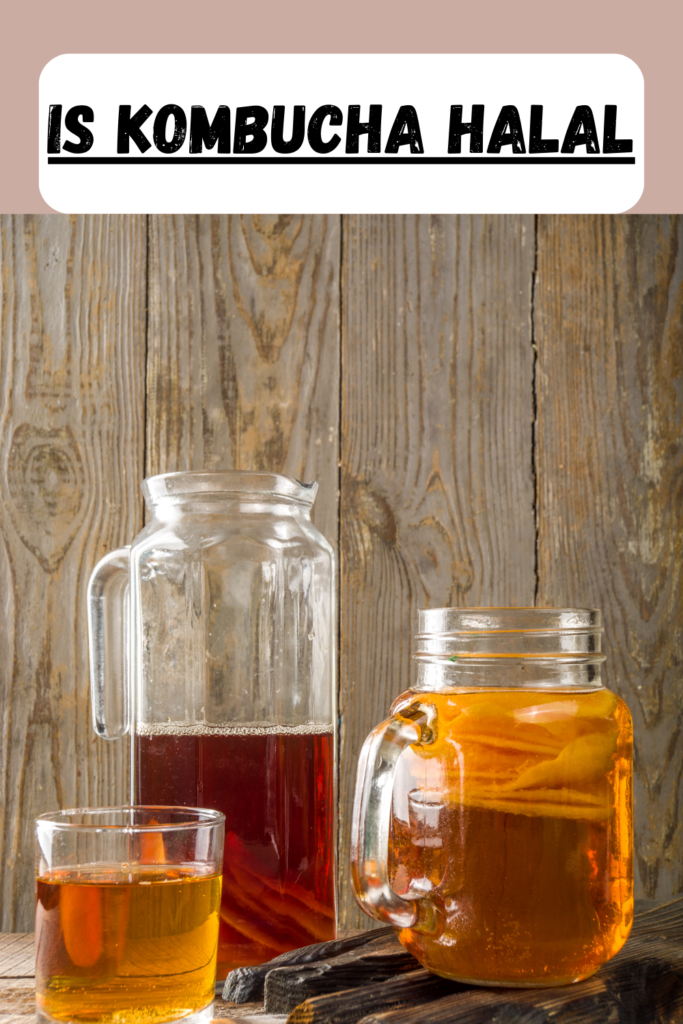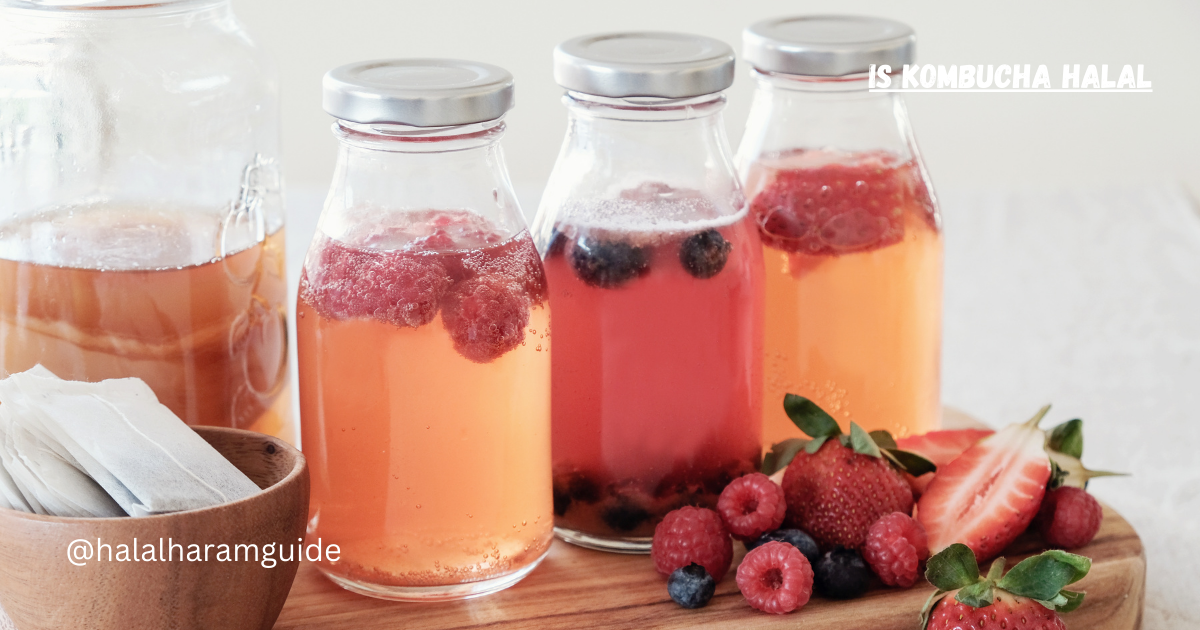In today’s exploration, we delve into a popular beverage and ask a common question: Is Kombucha halal?
If you’re curious about whether this trendy fermented drink aligns with Islamic dietary guidelines, you’re in the right place. In this post, we’ll break down the components of Kombucha and its status in the context of halal dietary practices.
So, let’s dive into this flavorful journey to uncover whether Kombucha earns the halal seal of approval.
What Is Kombucha?
Kombucha is a fermented beverage with a history dating back thousands of years, known for its unique taste and potential health benefits. It is made by brewing black or green tea, sweetening it with sugar, and then fermenting it with a colony of bacteria and yeast, often referred to as a SCOBY (Symbiotic Culture Of Bacteria and Yeast).
During fermentation, the SCOBY consumes the sugar and converts it into various organic acids, enzymes, probiotics, and a minimal amount of alcohol. The result is a slightly fizzy, tangy, and mildly sweet drink with a range of flavours, depending on factors such as the tea used and the length of fermentation.
Kombucha is celebrated not only for its distinct taste but also for its potential health benefits. It contains beneficial probiotics that can support gut health, as well as antioxidants that may help combat oxidative stress. Some enthusiasts also believe that kombucha can boost the immune system, aid digestion, and detoxify the body, although scientific research on these claims is ongoing.
Kombucha is available in various flavours, often infused with fruits, herbs, or spices, making it a versatile and refreshing beverage choice for many. While it has gained popularity for its potential health advantages, it’s essential to note that individual reactions to kombucha can vary, and it should be consumed in moderation, especially due to its slight alcohol content.
Is Kombucha halal?
Kombucha is a fermented tea beverage that is typically made by fermenting sweet tea with a culture of bacteria and yeast. Whether Kombucha is considered halal or permissible in Islam can depend on several factors:
Ingredients: The primary ingredients in Kombucha are tea, sugar, and a culture of bacteria and yeast (SCOBY). In their raw form, these ingredients are generally considered halal.
Fermentation: During the fermentation process, the yeast consumes the sugar and produces alcohol and carbon dioxide. The alcohol content in Kombucha is typically quite low, usually less than 0.5% alcohol by volume. Some scholars may consider Kombucha halal as long as the alcohol content remains within this limit, while others may have different interpretations.
Flavourings and additives: Some commercially available Kombucha products may contain additional flavourings, extracts, or additives. It’s essential to check the ingredient list to ensure that these additives are also halal.
Cross-contamination: Cross-contamination with non-halal ingredients or equipment used for brewing Kombucha can also be a concern. It’s essential to ensure that Kombucha production does not involve any non-halal substances or equipment.
Alcohol content testing: If you are unsure about the alcohol content of a specific brand of Kombucha, you may want to contact the manufacturer or look for Kombucha brands that explicitly state their alcohol content is below 0.5%.
How Is Kombucha Made?
Kombucha is crafted through a fascinating fermentation process. It begins with brewing a batch of sweet tea, typically using black or green tea and white sugar. After the tea cools, a symbiotic culture of bacteria and yeast (SCOBY) and some starter tea from a previous batch are added to the mixture.
This unique SCOBY transforms the sweet tea into Kombucha over the course of about a week to two weeks. During this time, the SCOBY consumes the sugar, producing a tangy, slightly effervescent beverage.
Once the desired tartness is achieved, the Kombucha is separated from the SCOBY and can undergo a secondary fermentation to carbonate it. The result is a fizzy, probiotic-rich drink that can be flavoured and enjoyed chilled.
Kombucha’s distinct taste and potential health benefits have made it a popular choice among those seeking a refreshing and probiotic beverage.
What Does Kombucha Taste Like?
Kombucha has a unique and complex flavour profile that combines sweet, sour, and slightly acidic notes. The initial taste is often described as sweet, owing to the residual sugar from the fermentation process.
As you take a sip, you’ll notice a tangy and tart sensation, which is the result of organic acids produced during fermentation, such as acetic acid and gluconic acid. Additionally, Kombucha can have subtle undertones of the tea used in its brewing, which might vary depending on whether black, green, or herbal tea was used.
The exact flavour can vary from one brand or homemade batch to another, allowing for a wide range of taste experiences within the Kombucha category.
Why Is Kombucha Considered Halal?
Kombucha is generally considered halal, or permissible in Islam, for several reasons. First, its primary ingredients, which include tea, sugar, water, and the SCOBY (Symbiotic Culture Of Bacteria and Yeast), are all inherently halal. Tea and sugar, for instance, are not prohibited in Islam.
Second, while Kombucha undergoes fermentation, which can produce alcohol as a byproduct, the alcohol content in Kombucha is typically very low, usually less than 0.5% alcohol by volume. This low alcohol content is unlikely to cause intoxication, which is the primary concern with alcoholic beverages in Islam.
Additionally, some Islamic scholars argue that the transformation of sugar into alcohol during fermentation does not necessarily render the final product haram (forbidden), as the intent is not to produce an alcoholic beverage.
However, it’s essential to verify the alcohol content of specific Kombucha brands and ensure that no prohibited ingredients or cross-contamination are involved in the production process to maintain its halal status.
Ultimately, the permissibility of consuming Kombucha may vary among Islamic scholars and individuals, and it’s advisable to seek guidance from a knowledgeable religious authority if there are any concerns.
Buying Kombucha In Muslim Countries:
Buying Kombucha in Muslim-majority countries may present some unique considerations due to religious and cultural norms. Here are some points to keep in mind:
Halal Certification:
Look for Kombucha brands that have obtained halal certification from reputable Islamic authorities or organisations. This certification ensures that the product complies with Islamic dietary laws and is considered permissible for Muslims to consume.
Check Alcohol Content:
Even though Kombucha typically contains low levels of alcohol (usually less than 0.5% by volume), it’s essential to verify the alcohol content on the label. Some countries may have stricter regulations regarding alcohol content in beverages, so be aware of local laws and regulations.
Homemade Kombucha:
Some individuals in Muslim-majority countries choose to brew their Kombucha at home, ensuring they have full control over the ingredients and fermentation process to align with their dietary requirements.
Ask for Recommendations:
Reach out to local Muslim communities or online forums to ask for recommendations on where to find halal Kombucha in your specific region. They may have valuable insights and suggestions.
Does Kombucha Contains Alcohol?
Yes, Kombucha does contain a small amount of alcohol as a natural byproduct of the fermentation process. During the fermentation of Kombucha, yeast consumes the sugar in the tea and converts it into alcohol along with other compounds like organic acids and carbon dioxide.
However, the alcohol content in commercially produced Kombucha is typically quite low, usually less than 0.5% alcohol by volume. This level is significantly lower than that of most alcoholic beverages, and it is generally not enough to cause intoxication.
While Kombucha does contain some alcohol, it is considered a non-alcoholic beverage in most regions, and its alcohol content is unlikely to pose any health or legal concerns for the vast majority of consumers.
However, individuals with specific dietary or religious restrictions should be aware of the alcohol content in Kombucha and may choose to seek out alcohol-free or halal-certified options if necessary.
Ingredients of Kombucha:
Kombucha is a fermented tea beverage that is typically made with the following ingredients:
Tea
Sugar
SCOBY
Starter liquid
Optional flavourings and variation
Fruit juice or fruit puree
Herbs and spices
Additional sweeteners
Conclusion
Whether kombucha is considered halal or not depends on several factors, including the ingredients used and the fermentation process. In its simplest form, kombucha is made from tea, sugar, and a SCOBY (Symbiotic Culture of Bacteria and Yeast). Tea and sugar are generally considered halal.
However, the halal status of kombucha may be affected by additional flavourings or additives used in some commercial kombucha products.To determine if a specific kombucha product is halal, it’s essential to check the ingredient list for any non-halal additives, such as alcohol-based flavourings or non-halal sweeteners.
FAQ’S
How should I drink kombucha?
Kombucha is typically consumed as a beverage. You can drink it straight from the bottle or glass. Some people like to serve it chilled, while others prefer it at room temperature. It’s a matter of personal preference.
Is there alcohol in Kombucha?
Yes, there can be trace amounts of alcohol in kombucha due to the fermentation process. However, the alcohol content is generally quite low, typically less than 0.5% alcohol by volume. This amount is similar to the alcohol content in some non-alcoholic beers and is not enough to cause intoxication.
Is there sugar in kombucha?
Yes, kombucha is typically made with sugar, which is needed to feed the SCOBY (Symbiotic Culture of Bacteria and Yeast) during fermentation. However, as the fermentation process progresses, the sugar content decreases. The final sugar content can vary depending on the fermentation time and recipe but is generally lower than the initial sugar content.
My Kombucha isn’t that bubbly
The level of carbonation in kombucha can vary depending on the fermentation process and the sealing of the container. If your kombucha isn’t very bubbly, you can try extending the fermentation time during the secondary fermentation phase, ensuring a tight seal on the container, or using a kombucha carbonation method like adding fruit juice or a small amount of sugar before sealing the bottle.
What are the benefits of Kombucha?
Kombucha is often promoted for its potential health benefits, which may include probiotics for gut health, antioxidants, and vitamins. However, the scientific evidence supporting these claims is limited, and individual responses can vary. It’s essential to consume kombucha in moderation as part of a balanced diet.
How long does Kombucha last?
The shelf life of kombucha depends on various factors, including the brand, production methods, and storage conditions. Typically, store-bought kombucha has a shelf life of several months when refrigerated. Homemade kombucha can last for several weeks to a few months when stored properly in the refrigerator.
Does Kombucha have vinegar in it?
Kombucha does contain acetic acid, which is also found in vinegar. Acetic acid contributes to the tangy flavour of kombucha and acts as a natural preservative. However, kombucha is not the same as vinegar and has a different flavour profile.
Can children drink Kombucha?
While kombucha is generally safe for most adults, it may not be suitable for young children, especially in large quantities, due to the trace alcohol content and potential for acidity. It’s advisable to consult with a paediatrician or healthcare professional before giving kombucha to children.
- “Is Lobster Halal? Understanding Its Permissibility”
- “Is Drawing Haram in Islam? Understanding the Perspective”
- “Is Fermented Kimchi Halal? Exploring Kimchi’s Halal Status”
- “Is Collagen Halal? Unveiling the Halal Status of Collagen”
- “Is Wine Vinegar Halal? Unveiling Its Permissibility”


